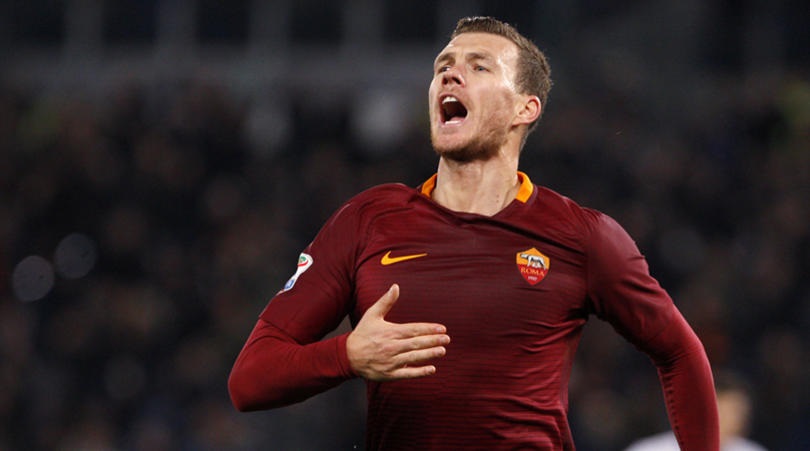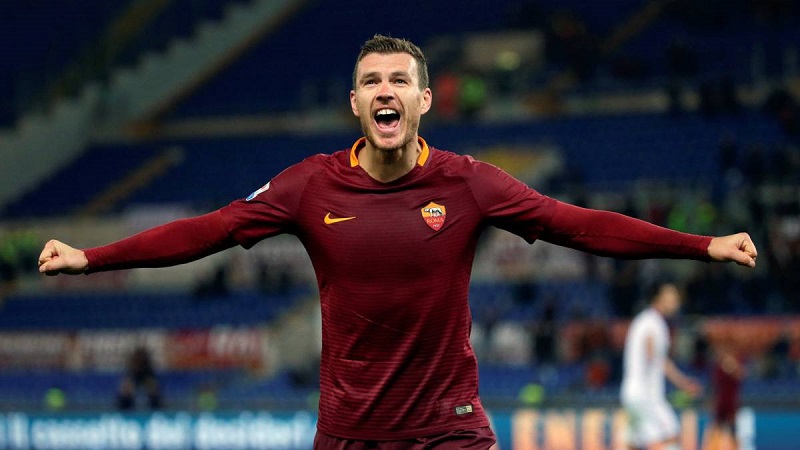
Roma supporters may harbour only slim hopes their team can once again overturn a three-goal Champions League deficit, but Bosnian fans of Edin Dzeko are convinced their hero will once again rise to the challenge.
In Bosnia, Roma striker Dzeko is known as the “Dijamant” — diamond.
“People love him because he has proved that it is possible to succeed even from this country as it is,” his friend Jasmin Ligata, 32, told AFP.
“Because he always stayed there with his heart and with his soul.”
Dzeko is one of Sarajevo’s ‘war children’.
The day after scoring what would prove to be a crucial away goal at Barcelona in the quarter-finals, Dzeko posted on Facebook, not about the match but about the anniversary of the start of the siege of his home town, which began on April 5, 1992, when he had just turned six.
The siege lasted almost four years.
“In a city where you didn’t know if you were going to see your best friend tomorrow, whether you’d hug your father or your mother again, whether you’d open your eyes or even go out to play with your friends, I spent every one of those 1,425 days under siege,” Dzeko wrote.
Bombs rained down, Serbian snipers spared no-one. Of the estimated 11,000 deaths, between 1,500 and 1,600 were children.
– ‘I survived’ –
“I was lucky and I survived, while many of my peers were wounded or are no longer with us,” he added. “To them in remembrance, I dedicate my goal against Barcelona in the Champions League.”
Dzeko’s parents still live in Sarajevo, a city even now dealing with the shadow of the siege.
The Sarajevo Memorial for Children Killed during Siege opened in a city park in 2010 carrying the engraved names of victims that relatives come and touch. The War Childhood Museum opened in the town last year.
Even amid the violence, the young Dzeko went out to play in their neighbourhood of Otoka.
“When he went out to play football,” his mother Belma recalled in 2010, “I was very scared.
“I did not forbid him to go out to play, even if it was crazy. He was playing all the time, the war meant nothing to him.”
One day, she did say no.
“He was crying, it hurt me.” But, she said, “a shell fell exactly where Edin played with other children, there were dead, wounded”.
Although he’s gone on to play in some of Europe’s biggest football league’s, Dzeko has never forgotten his humble beginnings.
“Edin was often there when we needed him the most,” said Ligata, a Bosnian sports press advisor who ran through a list of the times when Dzeko showed an uncanny ability to make unlikely triumphs possible.
There was the 92nd minute equaliser against Queens Park Rangers in 2012 that made possible the 3-2 victory that won Manchester City’s first English title since 1968. There were the 26 goals in 2008/09 that propelled Wolfsburg to their only Bundesliga title.
– ‘Great moments’ –
Even though Sergio Aguero and Grafite might have caught the eye in those teams, Ligata says Dzeko “is somehow predestined for great moments”.
Few moments have been greater than Roma’s quarter-final comeback against Lionel Messi’s Barcelona at the start of April, when the Italians kicked off at the Stadio Olimpico trailing by three goals on aggregate, as they will against Liverpool on Wednesday.
Dzeko had given his team hope by scoring an 80th minute away goal at the Camp Nou before fanning the flames of an unlikely comeback with a sixth-minute opener in the second leg.
He won a penalty converted by Danielo De Rossi on 58 minutes before Kostas Manolas completed the remarkable turnaround eight minutes from time.
Dzeko also started Roma’s fightback from five goals down at Anfield last week with an 81st minute strike.
At Zeljeznicar, the Sarajevo club where Dzeko started, his signature is on a wall and his name on a seat plaque, recognitions of donations to the renovation of a stadium which, during the war, was on the front line.
His first coach at Zeljeznicar, Jusuf Sehovic, remembers a little boy “interested only in going for goal… who kept calling for the ball” and was driven by “the will to work and the ambition to succeed”.
An old friend, Mirza Trbonja, 32, remembers the day in 2005 when he drove Dzeko to the airport to leave for Czech club Teplice.
“He was the same man then that he is today,” said Trbonja.
These days, though, when Dzeko flies back to his home town, he returns as a star.
“When he comes, you need a lasoo to catch 10 minutes with him,” added Trbonja. “When someone asks him for a photo or autograph, he never refuses.”
Agence France-Presse


































